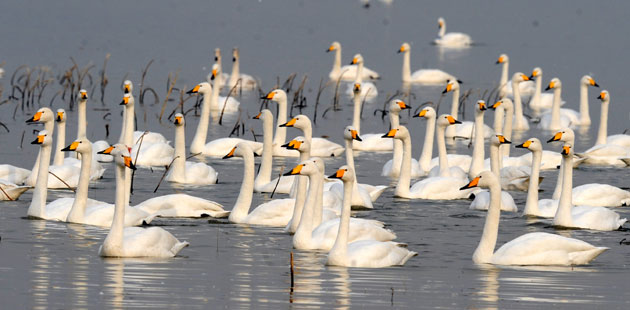EU's carbon tax meets turbulence
Updated: 2011-12-23 09:39
By Xin Dingding and Ding Qingfen (China Daily)
|
|||||||||||
BEIJING - China opposes the European Union's "mandatory and unilateral" carbon emission tax on airlines which Chinese experts called "a green barrier".
Europe's highest court upheld on Wednesday the right of the EU to impose a carbon cap-and-trade scheme on international airlines using European airports.
Many countries have come out against the EU move.
China hopes that the EU will act with caution and settle the issue in a positive and pragmatic way through consultation with relevant countries, Ministry of Foreign Affairs spokesman Liu Weimin said on Thursday.
According to the plan, all airlines flying to and from the 27 EU countries will have to pay for 15 percent of the polluting rights accorded to them in 2012, which will rise to 18 percent from 2013-2020.
The European Court of Justice ruled on Wednesday against a group of US airlines that challenged a European law requiring a carbon cap on all airlines flying to and from EU airports and forcing them to purchase permits from Jan 1 under the EU's emission trading plan.
Chinese airlines are also planning to follow the US step and file a suit against the EU.
"Air China is strongly against the carbon emission trading scheme and is looking for proper ways to solve the issue," Rao Xinyu, board secretary of Air China, said.
The scheme will have consequences for domestic airlines which are eyeing expanding their operations to and from Europe, said Lu Lingfei, deputy general manager of Air China's strategy and development department.
Lu said the EU will grant airlines a certain quota for free carbon emissions based on the records of their flights to and from Europe.
"Based on existing records, the total free emission quota for four Chinese airlines that have routes to Europe will be no more than that for a single established European airline," he said.
As Chinese airlines are set to open more routes to Europe, they may suffer more than their counterparts in developed countries.
Rao said that ticket prices for Air China flights to and from Europe will not rise, at least in the short term.
"We are disappointed with the court's decision," Chai Haibo, deputy secretary general of the China Air Transport Association (CATA), said.
"The association and some airlines have been in touch with lawyers and experts in Europe. But with this latest development we may need more time to study how to file the suit," he said.
The International Air Transport Association (IATA) on Thursday said that the EU court decision is a disappointment but not a surprise.
"The decision represents a European legal interpretation of EU emission trading scheme, however, the success of Europe's plans will depend on how non-European states view its legal and political acceptability. In this respect, there is growing global opposition," IATA said in a statement on Thursday.
Chai said that CATA had asked all its member airlines not to comply.
The association said the scheme will cost Chinese airlines about 800 million yuan ($123 million) in the first year and more than triple that by 2020.
"We asked Chinese airlines not to participate in the carbon trading, not to submit emission monitoring plans to the EU and not to negotiate with the EU about favorable terms," he said.
IATA believed that the EU move does not bring countries any closer to a much-needed global approach.
"What is needed is a global approach agreed through the International Civil Aviation Organization (ICAO)," said Tony Tyler, IATA's CEO.
The air transport industry has made global commitments to improving fuel efficiency by 1.5 percent annually to 2020, capping net emissions from 2020 and cutting net emissions in half by 2050 (compared with 2005 levels).
In 2010, principles were agreed through the ICAO on a global framework on economic measures. A commitment to developing a framework based on these measures for agreement at the 38th ICAO assembly in 2013 was also achieved.
"A global framework for economic measures is a critical component of our strategy to achieve these challenging targets. But we won't get agreement on a global approach if states are throwing rocks at each other because Europe wants to act extraterritorially," Tyler said.
Zhou Shijian, senior trade expert from Tsinghua University, said the EU move is a type of "green barrier" that could spark a trade war.
"It goes against the UN principle of 'common but differentiated responsibility' in dealing with carbon emissions," he said.
"Even if the EU adopted the measure, it should start with developed countries, not developing ones."
However, Zhang Yansheng, director of the Institute for International Economics Research of the National Development and Reform Commission, said it is nearly impossible to change the EU's decision to levy the tax.
Shen Mingchun contributed to this story.
Related Stories
France to tax carbon emission in 2010 2009-09-11 13:51
EU may tax carbon emissions on airplanes entering EU airspace 2009-10-28 17:20
Airlines to cut carbon emissions 2009-04-01 08:08
Carbon emissions reduced 2007-05-17 06:55
- ChemChina to boost investment
- Yahoo mulls selling most of its Alibaba stake
- China to spend less on railway construction in '12
- Revised draft might encourage land hoarding
- Trade with Russia 'needs shot in arm'
- New fall in economic outlook: bank poll
- EU's carbon tax meets turbulence
- Chinese IT market set to surge, says researcher










